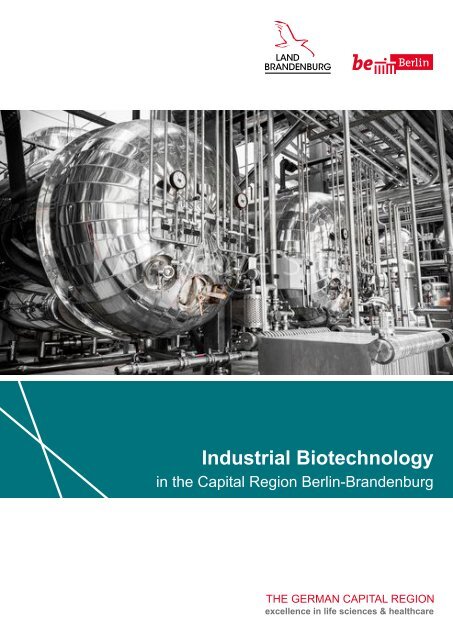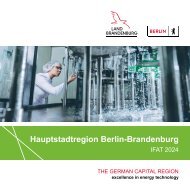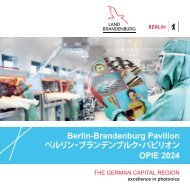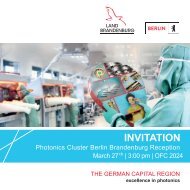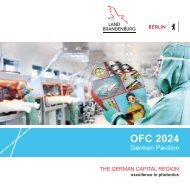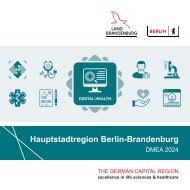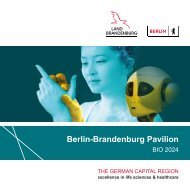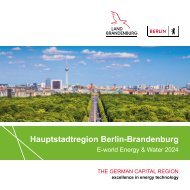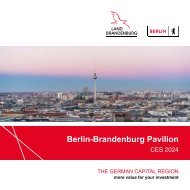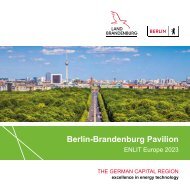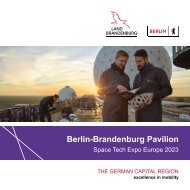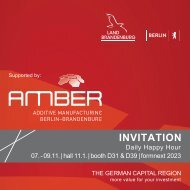Industrial Biotechnology
Create successful ePaper yourself
Turn your PDF publications into a flip-book with our unique Google optimized e-Paper software.
<strong>Industrial</strong> <strong>Biotechnology</strong><br />
in the Capital Region Berlin-Brandenburg
Future Industry in the Capital Region<br />
Companies<br />
(selection)<br />
Algenol Biofuels<br />
AnalytiCon Discovery<br />
ANiMOX<br />
AVEBE<br />
BASF Schwarzheide<br />
bbi-biotech<br />
Biopract<br />
Bioworx<br />
CellDeg<br />
CONDIO<br />
CS carbon Solutions<br />
Cyano Biotech<br />
DexLeChem<br />
Dr. Götz Verfahrenstechnik<br />
Biotechnik Umwelttechnik<br />
evoxx technologies<br />
Herbafood Ingredients<br />
HF Biotec Berlin<br />
LXP Group<br />
MINT Engineering<br />
NovaBiotec ® Dr. Fechter<br />
Organobalance<br />
Prefere Resins Holding<br />
solaga<br />
SunCoal Industries<br />
VERBIO Ethanol Schwedt<br />
The capital region has developed into one of<br />
the leading German biotechnology locations –<br />
with more than 240 biotech enterprises in which<br />
almost 5000 people are employed. Of those,<br />
around 54 companies operate in the industrial<br />
biotechnology sector, which is also called the<br />
white biotechnology. Their goal is to<br />
• exploit biogenic raw materials<br />
for industrial production,<br />
• design more sustainable production<br />
processes, and<br />
• improve the competitiveness of the industry.<br />
The industrial biotechnology bears the potential<br />
of bringing forth innovative products and new<br />
production processes that save energy, costs<br />
and greenhouse gases and contribute towards<br />
becoming less dependent on fossil raw materials.<br />
Therefore, the industrial biotechnology has<br />
interfaces to numerous sectors.<br />
<strong>Industrial</strong> biotechnology<br />
in the nutrition industry<br />
One of the most important industry branches<br />
of the region is the nutrition industry. It not only<br />
extraction and<br />
processing of<br />
raw materials<br />
intermediate<br />
products<br />
production<br />
renewable raw<br />
materials<br />
starch, sugar, oils,<br />
proteins, fibres, …<br />
harvest and<br />
storage<br />
plants<br />
Recycling<br />
profits from the use of long-known auxiliary<br />
means such as yeast and bacteria. Enzymes<br />
and new processes are also utilized. Healthier<br />
food and animal feed are the goal. The use of<br />
probiotic bacteria that protect against illnesses<br />
or prebiotics that promote the growth of beneficial<br />
bacteria are examples for the practical<br />
application of biotechnology. The potentials of<br />
microorganisms are researched in the region.<br />
For this purpose, new bacterial strains with<br />
extraordinary capabilities are looked for or new<br />
ways found to utilize algae – for example as<br />
dietary supplement. Research generally has<br />
great importance: the capital region has one of<br />
the densest research landscapes in Europe.<br />
The proximity of science and economy as well<br />
as diverse networks – for instance in the Food<br />
Industry Cluster – promote cooperations and<br />
the transfer into practice. Successful business<br />
startups develop and use technologies and<br />
processes of the industrial biotechnology and<br />
allow the region to become an important<br />
exporter of technology.<br />
Food Industry Cluster<br />
www.ernaehrungswirtschaft-brandenburg.de<br />
end products<br />
and their use<br />
collection<br />
collection point<br />
residues + CO 2<br />
and water<br />
photosynthesis<br />
fertilizer, mineral<br />
substances and<br />
substances for the<br />
improvement of the<br />
soil structure<br />
use of residual<br />
material and waste<br />
energy production<br />
biogas plant,<br />
biofuel plant,<br />
combustion<br />
(electricity, heat)<br />
The concepts made possible through the industrial biotechnology have a recycling economy as their goal. An economy in<br />
which residual and waste materials of one process are turned into the raw materials of another. But also the products themselves<br />
become raw materials after their use. To reach this goal, the capital region is well-positioned in science, research and the<br />
transfer into the implementation. The large state of Brandenburg as well as the city Berlin can simultaneously supply biogenic<br />
raw and residual materials.
<strong>Industrial</strong> biotechnology<br />
for chemical and material use<br />
One focus of the regional expertise in the industrial<br />
biotechnology sector lies on methods<br />
and procedures for the production of biopolymers<br />
for biobased and biologically degradable<br />
plastics. Pioneering practical implementations<br />
are the Innovations Center Bioplastics Lausitz<br />
and the PLA pilot plant in Guben. In this region,<br />
new paths are sought for producing basic and<br />
specialty chemicals from biomass as well as to<br />
optimize processes and to make them more<br />
sustainable. Regional know-how is offered to<br />
the pharmaceutical and fragrance industry, for<br />
example re-using methods for catalysts. Biorefineries,<br />
which produce diverse intermediate<br />
and end products based on biogenic raw and<br />
residual material for the industry as well as<br />
energy sources, follow a complex concept.<br />
Plastics and Chemistry Cluster<br />
www.kunststoffe-chemie-brandenburg.de<br />
Using biotechnology for the<br />
generation of energy<br />
Next to biodiesel, bioethanol and biomethane<br />
also glycerin and as cogenerated products fertilizer<br />
and feedstuff are produced with the help<br />
of biotechnological procedures at the biorefinery<br />
in Schwedt (Oder). Furthermore, a technology<br />
was developed in the region that enhances the<br />
efficiency of biogas plants and broadens the<br />
range of raw materials that can be used in the<br />
plants. Wood and wood-like substrates including<br />
plant waste such as leaves can thus be<br />
used in biogas plants. These technologies fit<br />
into the picture of the capital region. Because<br />
concerning the energy supply, it places its bets<br />
on “green”. One pioneer is the waste-to-energy<br />
plant in Ruhleben. To produce electricity and<br />
long-distance heating, it turns organic waste<br />
into high-pressure steam that replaces fossil<br />
raw materials such as hard coal.<br />
Cluster Energy Technology<br />
www.energietechnik-bb.de<br />
Interview with<br />
Dr. Joachim Venus<br />
How do you see the industrial<br />
biotechnology embedded in the region?<br />
It is part of one of a total of four focal area in the<br />
Berlin-Brandenburg master plan and thus one<br />
of the strategic goals of the region.<br />
Which priorities do you see for<br />
a further development?<br />
The master plan defines the guidelines for this<br />
also. One focal point is to promote the communication<br />
between science and economy. If a<br />
faster transfer from research into practice is<br />
achieved, the value creation potentials of biotechnology<br />
can properly unfold. Another focus<br />
is the targeted support of the innovative capabilities<br />
of small and medium-sized enterprises.<br />
At the same time, assistance is required to stimulate<br />
and accompany spin-off companies but<br />
also to further the establishment of cooperations<br />
with large enterprises.<br />
What could the support from<br />
both federal states, Berlin and<br />
Brandenburg, look like exactly?<br />
Measures for the identification of the most innovative<br />
ideas and their cross-state support<br />
are important. Already a fixed part in the master<br />
plan are the biotechnological applications<br />
for a healthy diet and food safety as well as the<br />
support of technology platforms and pilot<br />
plants, for example for the use of lignocellulose<br />
from residual materials. Their cross-state<br />
support is a prerequisite to tap into additional<br />
sources of financing and to create a startup<br />
climate. Besides, young talents must be supported<br />
in a targeted fashion. Retaining the<br />
younger generation in the region is crucial for<br />
a further expansion of the industrial biotechnology<br />
and thus for the development of many<br />
sectors.<br />
Research facilities<br />
(selection)<br />
Fraunhofer Institute for<br />
Applied Polymer Research<br />
(IAP)<br />
Helmholtz-Zentrum<br />
Geesthacht<br />
Institut für Getreideverarbeitung<br />
(IGV)<br />
Institute for Food and<br />
Environmental Research<br />
(ILU)<br />
Leibniz Institute for<br />
Agricultural Engineering<br />
and Bioeconomy (ATB)<br />
Max Planck Institute of<br />
Colloids and Interfaces<br />
Versuchs- und Lehranstalt<br />
für Brauerei in Berlin e. V.<br />
Biotech parks<br />
berlinbiotechpark<br />
Biotech Campus Potsdam<br />
Luckenwalde<br />
<strong>Biotechnology</strong> Park<br />
Campus Berlin-Buch<br />
co:bios Technology Center<br />
Hennigsdorf<br />
GO:IN Golm Innovationszentrum<br />
Potsdam<br />
Innovationspark Wuhlheide<br />
Berlin<br />
Science and Technology<br />
Park Adlershof<br />
Dr. Joachim Venus<br />
Leibniz Institute for Agricultural<br />
Engineering and Bioeconomy<br />
(ATB) and member<br />
of the body of experts of the<br />
focal area biotechnology<br />
& pharmaceuticals of the<br />
Food Industry Cluster
<strong>Industrial</strong> biotechnology<br />
in the capital region at a glance<br />
With 240 enterprises and 5000 employees, the capital region<br />
is one of the leading German biotechnology locations<br />
54 companies cover the relevant topics of the modern industrial biotechnology<br />
as service providers, developers of technologies and producers<br />
University and non-university research institutes ensure<br />
the scientific advance in the development of technology<br />
Focal points in research and industry are amongst others:<br />
- bioprocess engineering<br />
- biocatalysis - enzyme development<br />
- microbiology<br />
- metabolomics<br />
- prebiotics and probiotics<br />
- decentralized bioenergy production<br />
- algae biotechnology<br />
- natural products development<br />
All cross-sectional technologies for the industrial biotechnology are present<br />
Outstanding raw material base for the industrial biotechnology<br />
Closed value-added chain in the use of renewable<br />
raw materials for material extraction, nutrition and bioenergy<br />
Excellent infrastructure for research and pilot production<br />
of biopolymers and products for food, chemistry and bioenergy<br />
Availability of qualified skilled personnel<br />
Photos: Cover: fotopic - fotolia.com, Innen: ATB Bornim, Michael Jungblut<br />
Design: genius gmbh Print: Laserline, Berlin<br />
© February 2018<br />
EUROPEAN UNION<br />
Berlin Partner für Wirtschaft<br />
und Technologie GmbH<br />
Fasanenstr. 85<br />
10623 Berlin | Germany<br />
www.berlin-partner.de<br />
Twitter: @BerlinPartner<br />
Contact<br />
Ullrich Stein<br />
Wirtschaftsförderung Land<br />
Brandenburg GmbH (WFBB)<br />
Babelsberger Str. 21<br />
14473 Potsdam | Germany<br />
www.wfbb.de<br />
Contact<br />
Florian Schlehofer<br />
Publisher: Berlin Partner for Business and Technology in<br />
cooperation with Brandenburg Invest (WFBB), commissioned<br />
by the Berlin State Senate Department for Economics, Energy<br />
and Public Enterprises and the Brandenburg State Ministry for<br />
Economic Affairs and Energy. Funded by the State of Berlin<br />
and The State of Brandenburg as well as the Investitionsbank<br />
Berlin, cofunded by the European Union – European Regional<br />
Development Fund.


